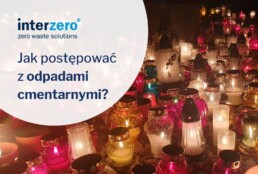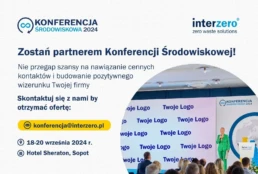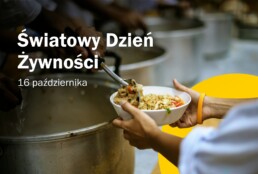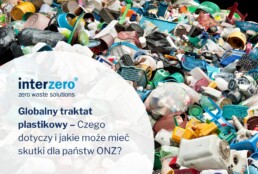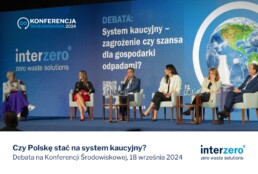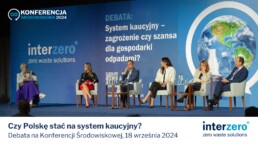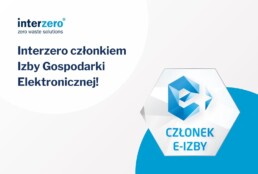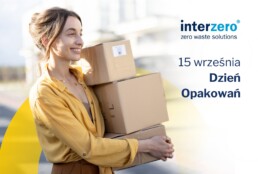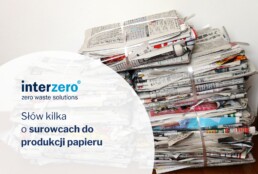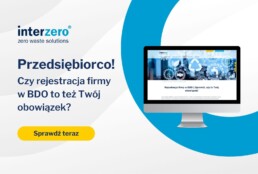Where to dispose of glass candles? Cemetery waste management
Where to dispose of glass candles? Cemetery waste management
As All Saints' Day approaches, the efficient management of cemetery waste becomes particularly important. It is around this holiday that we generate the most waste, the sorting and subsequent management of which can be a challenge for both cemetery visitors and waste companies.
On what basis is the management of cemetery waste carried out?
As interpreted by the Ministry of Climate and Environmentwaste generated in cemeteries is classified as municipal waste. Their collection and disposal should be carried out on the basis of a contract with an entity entered in the register of regulated activities for the collection of municipal waste from property owners[I].
The obligation to manage cemetery waste, and therefore to sign an appropriate contract, rests with the managers of the cemeteries. In the case of municipal cemeteries, this is therefore the responsibility of mayors and town mayors, while parish cemeteries are the responsibility of parish priests.
Cemetery waste management activities intensify around All Saints' Day, when the containers placed at necropolises quickly become overflowing. No wonder - every year Poles buy around 300,000 new candles, and as many as 45% of these are sold during the Feast of the Dead[II]. Therefore, before 1 November managers of cemeteries place additional bins in them for waste (sorted and mixed) and increase the frequency of waste collection and disposal.
Request cemetery waste collection - either as a one-off or as an ongoing collaboration.
Cemetery waste has its own code in BDO
Cemetery waste is a relatively wide and diverse group. This includes, among others, candles (clean and soiled with wax), metal and plastic candle lids, artificial, cut and potted flowers (including pots), but also cleaning products and soiled cleaning cloths. Cemetery waste is catalogued in waste catalogue group 20 as municipal waste with the code 20 02 03 - other non-biodegradable waste.
Due to the classification of cemetery waste as municipal waste, they are subject to mandatory separate collection for paper, plastics and metal, glass, biowaste and an additional fraction - mixed waste.
Segregation of cemetery waste - not only ecological, but also economical
The compulsory separate collection of cemetery waste not only reduces the costs of maintaining the necropolis, but also allows at least some of the valuable raw materials to be recovered. As statistics show, the scale of waste generated is enormous. Only between 27 October and 5 November 2023, the Warsaw MPO collected over 44 tonnes of waste from 2 necropolises: the Powązki and the Wolski Cemeteries. It is estimated that 3 to as much as 9 kg of waste per grave during All Saints' Day[III], which amounts to a total of around 100 000 tonnes of waste nationally. Unfortunately, many of them end up in the wrong bin, (usually a container for mixed waste), which rules out the possibility of returning it. Let's find out where to dispose of the most common cemetery waste.
Where to dispose of glass candles?
Glass candles are not made of container glassand are therefore not recyclable. It should therefore be disposed of in the container for mixed waste. Other traditional candles: plastic, ceramic and clay must also go into the mixed waste.
If the candle is still in good condition and is reusable after the new arrangement has been placed in it, it is worthwhile leave it on a special rack, the so-called "candle holder.
Where to dispose of candle refills?
Traditional candle refills are always soiled with wax and are not suitable for processing in a recycling facility. They should therefore be discarded to the mixed waste container.
Where to dispose of LED battery-powered candles?
Broken electronic LED candles are electro-waste (and therefore hazardous waste) that must be disposed of into a special container for electro-waste (usually red), return it to the PSZOK or to retailers collecting electro-waste. The used battery of such a candle should be removed and disposed of in a special battery container.
Where to dispose of cut flowers?
Cut flowers can be discarded for bio-waste, separating cellophane, ribbons and other additives from them. Cellophane and plastic ribbon should go into the yellow bin for plastics and metal, and fabric ribbon into mixed waste.
Where to dispose of artificial flowers, bunting and wreaths?
Artificial flowers should be discarded into a black container on mixed waste.
Where to dispose of potted chrysanthemums?
The most environmentally friendly option recommends separating the pot (it can be reused or disposed of in the yellow bin), breaking off the twigs (they go into bio waste) and disposing of the soil with the roots of the plant in mixed waste.
In a slightly less optimal option, the entire chrysanthemum, together with the pot and soil, can be discarded to the mixed waste container.
If you don't know where to dispose of your remaining cemetery waste, use the waste search engine.
Selective collection of candle waste
Optimisation of cemetery waste management is undoubtedly a major challenge for the waste industry, and not only in Poland. Struggling with the huge amount of waste from candles the Slovenian authorities have made the separate collection of used candles compulsorywhich are a separate fraction of municipal waste. The collection is carried out in special containers placed in or near cemeteries. Its principles are analogous to the Polish principles of collecting waste into a green bag - selectively collected candles may not be crushed, compacted, contaminated or mixed with other waste.
[I] https://www.prawo.pl/samorzad/segregacja-i-wywoz-odpadow-na-cmentarzu-frakcje-oplaty,520365.html
[II] https://businessinsider.com.pl/finanse/rozmawialismy-z-potentatem-zniczy-stad-ida-na-cala-europe-zdjecia/947640q
[III] https://tvn24.pl/biznes/z-kraju/1-listopada-swieto-wszystkich-swietych-polski-recykling-rocznie-przez-polskie-cmentarze-przewija-sie-100-120-tys-ton-odpadow-st7417954
32 million tonnes in households and 60 million tonnes overall - that's how much food is wasted in the EU
On the occasion of the International Food Waste Awareness Day, which is celebrated on 29 September each year, Eurostat presented data for 2022 on the scale of food waste in EU countries. On the occasion of World Food Day, celebrated on 16 October, the data is presented below.
72 kg per capita - that's how much food we wasted at home in 2022.
Food waste is one of the biggest global problems, affecting not only the economic but also the environmental and ethical spheres. Recently published Eurostat figures show that as much as 59.2 million tonnes of food waste will be generated in EU Member States in 2022. As much as 54% of this waste, or 32 million tonnes, was wasted in households. It can therefore be hazarded to say that each person in the EU threw away as much as 72 kg of food. If we translate these figures into an average five-person household, it turns out that in the whole of 2022, its inhabitants wasted as much as 360 kg of food, or almost 1 kg per day. Let's remember that we are only talking about food from household fridges and cupboards!
Reporting obligation as part of a strategy to reduce food waste
The data presented in the Eurostat Communication are taken from EU Member State reports prepared in accordance with the methodology defined in EC Decision 2019/1597 of 3 May 2019. Under the Waste Framework Directive (2008/98/EC), each country is obliged to submit an annual report on measuring food waste. 2022 was the third year in which reports were prepared in accordance with the methodology.
Let us recall that in 2020, i.e. in the first reporting year, a total of almost 57 million tonnes of food waste was generated, or 127 kg per capita. In 2021, this was 58.4 million tonnes and approximately 131 kg per average person in the Member States, respectively. Significantly, all of the quoted data were collected during the Covid-19 pandemic periodwhich has had a significant impact on the activities of the manufacturing and food processing sectors,
As reported by Eurostat:
The impact that the end of the lockdowns associated with the Covid-19 pandemic may have had on both industries is still being investigated.
Where is the most food wasted?
Among those responsible for the generation of food waste, definitely dominated by the households already mentioned. The following places were followed by:
- food and beverage manufacturers - 19%, or more than 11 million tonnes,
- catering industry - 11%, or less than 7 million tonnes,
- primary production sector (agriculture) - 8%, or almost 5 million tonnes,
- retailers and other distributors - 8%, or just under 5 million tonnes.
It should be noted that entrepreneurs generating food waste are increasingly using professional composting machinerywhich enable this waste to be processed into pre-compost.
In addition to data for the EU as a whole, we also have data for 2022 for individual countries, including Poland. Total more than 4.5 million tonnes of food waste were generated in our country, of which:
- over 2.5 million tonnes in households,
- 720,000 tonnes in the primary production sector,
- 550,000 tonnes at processing companies,
- 470,000 tonnes at retail outlets,
- 260k in catering.
The aforementioned 4.5 million tonnes of food waste places us in an infamous 4th place among Community countries. Per capita, this is approximately 119 kg of wasted food. By contrast, we rank 16th in the EU as a whole with this result.
Interzero's range of eco-equipment also includes. small electric composter Oklin designed for households to help reduce food waste by creating compost from kitchen waste.
Check also, how to separate bio-waste.
Obligation to conduct public education campaigns
Pursuant to Polish law, every entrepreneur who places packaged products on the market is obliged to conduct public education campaigns. The purpose of these campaigns is to inform and educate consumers. Furthermore, entrepreneurs are obliged to allocate at least 2% of the total value of packaging placed on the market in the previous year to educational activities. Interzero, as a leader in waste management and recycling, not only fulfils these obligations, but also meets the needs of the market by offering a wide range of educational services. Action Fraction is just one of the many projects that Interzero carries out to build environmental awareness in society.
Sources:
- Eurostat, Food waste and food waste prevention - estimates, https://ec.europa.eu/eurostat/statistics-explained/index.php?title=Food_waste_and_food_waste_prevention_-_estimates#In_the_supply_and_consumption_sectors.2C_food_waste_generation_may_represent_10.25_of_food_supplied_in_the_EU
- Eurostat, Food waste per capita in the EU remained stable in 2021, https://ec.europa.eu/eurostat/web/products-eurostat-news/w/ddn-20230929-2
- Eurostat, Food waste: 127 kg per inhabitant in the EU in 2020, https://ec.europa.eu/eurostat/web/products-eurostat-news/-/ddn-20220925-2
- European Foods Bank Federation, First EU-wide monitoring of food waste: 127 kg per inhabitant in the EU in 2020, https://www.eurofoodbank.org/first-eu-wide-monitoring-of-food-waste/
Global plastic treaty getting closer. Will the US support the project?
Global plastics treaty edging closer - US may support limits on plastic production
Washington may support a draft treaty being worked out at the UN that calls for an end to plastic waste pollution. The US is likely to join the ranks of countries willing to impose restrictions on global plastic production, according to a Reuters source.
United States in favour of limiting and reducing plastic production
The work to construct the treaty follows the adoption of UNEA Resolution 5/14 of March 2022, in which the 175 countries have declared their willingness to conclude an agreement to end plastic waste pollution. However, this date has been put in doubt due to, among other things, the opposition of China, Saudi Arabia and the US to the inclusion of provisions on the control of plastic production in the treaty.
As Reuters reports, despite declarations in early 2024, US likely to decide to support plastic treaty, joining the ranks of countries calling for a gradual reduction in the amount of plastics produced. Support for the treaty has already been expressed by EU member states, South Korea, Peru and Rwanda, among others. The last round of treaty negotiations is scheduled for the second half of November 2024. It is noteworthy, this date comes just two weeks after the US presidential election, which may be crucial to the position that US representatives at the UN will ultimately take.
UN plastic treaty like SUP directive? Are we facing a global plastic revolution?
Developed within the UN framework, the treaty aims to oblige countries to end plastic pollution and to take action to protect the environment and human health from the effects of the production, use and generation of plastic waste. The treaty text is to include both binding and voluntary remedies. The far-reaching idea, on the other hand, is to move towards a global closed-loop economy for all plastics.
For EU member states, the planned The global measures are, as it were, in addition to the provisions arising from the so-called 'globalisation'. SUP plastic directivewhich also aimed to reduce plastic pollution. EU regulations not only imposed obligations on manufacturers to record, charge and label products containing plastics, but also forced to provide consumers with more environmentally friendly alternatives to plastic packaging disposable.
Made4Loop, Interzero's answer to the plastic treaty and SUP directive
As a leader in sustainability, Interzero is following European trends and is ahead of global trends by introducing a service Made4Loop - a deposit system for reusable packaging that is an alternative to plastic-containing disposables. With Made4Loop, we help entrepreneurs to comply with the requirements introduced by the SUP Directive, as well as to prepare in advance for the new regulations in the emerging plastic treaty.
Implementation of the Made4Loop service is a guarantee for the smooth implementation of legal obligations (SUP, ROP), reducing waste management costs and improving ESG indicators. What's more, with customised packaging, cups and boxes for takeaway meals, we enable our customers to build an image as a socially responsible company with sustainable practices.
Explore All the benefits of implementing Made4Loop in your business!
Can Poland afford a bail system? Delloite estimates investment and operating costs
The bail system was discussed by participants Interzero 2024 Environmental Conference. From left, Monika Richardson, Joanna Leoniewska-Gogola from Deloitte, Paweł Sosnowski from Interzero, Joanna Szubielska from Eurocash, Maria Andrzejewska from UNEP/GRID-Warszawa and Dariusz Lizak from KIGPR.
Can Poland afford a bail system? Delloite estimates investment and operating costs
In just a few months, a deposit system will start operating in Poland. In view of the impending revolution in the packaging market, Delloite contacted all stakeholders and estimated the costs of implementing and operating the system in our country.
More than 37bn over 10 years - that's how much we will pay for the bail system by 2034.
In the 2024 published in September. Report Bail system in Poland - costs, prospects, opportunities Delloite experts have calculated the cost of implementation of the bail-in system for more than PLN 37 billion over the first 10 years functioning.
- By 2034. the investment cost alone will amount to PLN 14.2 billion. More than 60% of this amount will be spent on building work to make the shops suitable for collection. Another item in the cost structure is the purchase of bottle machines, which will consume more than 20% of the amount indicated.
The authors of the report assumed that the collection of all types of packaging covered by the Polish deposit system would be carried out in a mixed way, both manually (using bag systems) and automatically, using verification and destruction machines for the deposit system. Estimated the cost of implementing automatic collection will amount to PLN 12.5 billion and manual collection to PLN 0.9 billion.
- The 10-year cost of the Polish bail system will turn out to be even higher, which may amount to PLN 24.3 billion in the optimistic scenario and PLN 21.7 billion in the pessimistic one. For the time being, experts assume that the intermediate, realistic scenario will come true, and the The operating cost of the bail-in system between 2025 and 2034 will close at PLN 23.1 billion.
Cost of operating bail system dependent on pace of change implementation
From 2025 onwards, the annual cost of operating the bail system will gradually increase. In the most likely scenario in the first year of the system's operation it will be 0.9 billion, and after 10 years it will be 2.9 billion. According to Delloite specialists' estimates, by 2034 total operating costs will reach £23.1bn, of which:
- 38,91% will be earmarked for automatic collection in shops,
- 26.5% will cover the cost of manual collection at logistics and counting centres,
- 20,24% will go to a manual collection run in shops,
- 14,17% will be allocated for automatic collection at counting and logistics centres.
Estimated in the report the operating costs of the deposit scheme may in fact change and quite significantly. The final amount will depend, among other things, on the level of collection, the amount of unclaimed deposit for packaging and the rate at which the employees operating the bottle and bag systems and those working in the logistics centres are introduced to their new responsibilities. Importantly, the macroeconomic assumptions of the presented forecast may also change. For the purposes of the report, it has been assumed that the consumer price index (CPI) will decline from 11.4% in 2023 to 2.9% in 2027, with fluctuations of no more than 0.2 pp in subsequent years. Nominal wage growth will also decelerate, as assumed, from 11.9% in 2023 to 5.4% in 2027-2034.
Costly collection of plastic bottles
The referenced Delloite report also presents the investment costs of implementing a deposit system, broken down by the types of packaging covered. As it turns out, more than half of the expenditure (7.5 billion over 10 years) will be related to the collection of plastic bottles. Much less, 3.6 billion, will be invested in the collection of metal cans. Reusable glass bottles will not be included in the deposit system until 2026, one year later than other types of packaging. Investment outlays for their collection are the lowest - according to Delloite estimates, they will total PLN 3.1 billion by 2034.
To read more about the costs, opportunities and prospects of the bail system, read in the latest Delloite report.
15 September Packaging Day. How has the packaging industry changed in the last year?
Packaging Day was established in 2007 by the Polish Chamber of Packaging. Its aim was to spread awareness of the different types of packaging and to emphasise their role not only in everyday life, but also in the economy. Let us therefore take a moment to summarise the most important changes that have taken place in the past year in the packaging industry and beyond.
Implementation of the SUP Directive
Adopted in 2019. Directive (EU) 2019/904 of the European Parliament and of the Council on the reduction of the environmental impact of certain plastic products (so-called SUP Directive) will not be implemented in Poland until 2023. From May 2023 onwards. further obligations entered into force, the effects of which were felt not only by packaging producers, but also by consumers:
- 24 May 2023. 9 categories of plastic products and packaging were banned from the market and mandatory labelling of single-use products containing plastic was introduced,
- 1 January 2024. charges have been introduced of £0.25 per unit for disposable cups and takeaway food packaging and
- On 1 July 2024, businesses were obliged to provide reusable alternatives to disposable packaging of plastics. Even before these changes came into force, Interzero had started offering customers a service Made4Loop, a deposit system for reusable packaging,
- From 1 July 2024, the following were also introduced obligation to affix nuts permanently attached to bottles or cartons.
The development of the bail system in Poland
In August 2023, it came into force an act setting out the legal framework for the operation of the bail system in Poland. Since then, multi-faceted work on the implementation of the system in our country has begun, which has included, among other things, the creation of further representative entities, the setting of deposit amounts for the various types of beverage packaging, the implementation of collection, logistics and deposit accounting systems, and the popularisation and installation of .
Every now and then, there were discussions in the packaging and bottling industry about the need for changes to the system even before it took off. These resulted in, among other things. delaying the inclusion of reusable glass bottles in the deposit system and excluding milk bottles from the system and other dairy products.
Interzero 2024 Environmental Conference - a glimpse into the future of the packaging industry in Poland
The annual Environmental Conference organised by Interzero is a a great opportunity to take stock of the past yearbut also to prepare for the future that the legislator has in store for the entire packaging industry.
Already on 18-20 September 2024 at the Sopot Sheraton Among other things, we will talk about the latest preparations for the implementation of the deposit system, innovative circular business solutions and the PPWR packaging regulationwhich could soon turn the functioning of the packaging industry upside down. On the second day of the Conference, we will hear a discussion on the costs of implementing PPWR and about the biggest challenges in the design, production and recycling of packaging. Interzero's representative will be Vice President Paweł Lesiak, who will share, among other things, the experience gained in designing ecological packaging for Interzero's customers as part of the Made4Circle services.
For the full agenda of the Interzero 2024 Environmental Conference and a link to registration, see event page.
Universal USB-C charger - the new EU standard
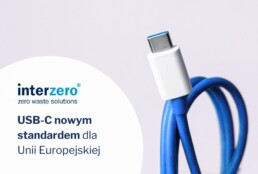
Why will a universal USB-C charger be the standard for all devices?
The USB-C universal charger will be standard for all by the end of 2024. Why? This is a top-down order from the European Union, which is primarily aimed at directing consumers towards greener purchasing choices.
Under EU rules, all phones, tablets and cameras sold in the EU will have to have a USB Type-C port by the end of 2024, and from spring 2026 the requirement will also be extended to laptops.
From this article you will learn:
- what type of chargers dominate the market and why EU demands for devices with a charging port have arisen;
- which mobile devices will be affected and when the new rules will come into force;
- what direction the European Parliament is going in with regard to waste and ecology in general.
Universal charger for all devices
Among the regulated devices were mobile phones, tablets, games consoles, electronic readers and others portable equipment. All those devices that charge by wire and that operate at up to 100 watts will have to be equipped with a USB Type C port - regardless of the manufacturer. This is a landmark decision that aims both to simplify the lives of consumers and to reduce the negative impact of electrical and electronic waste on the environment. The European Commission and the European Parliament have unanimously recognised that this solution will have a positive impact on the ecosphere and allow for a minimal reduction in consumerism.
Customers are to choose for themselves whether to purchase a new device with or without a charger. This should reduce the accumulation of electro-waste in homes and thus the dumping of electro-waste in inappropriate bins. The EU estimates that broken and unused chargers account for around 11,000 tonnes of waste. This is an intimidating amount - but the next question begs to be asked - what about chargers with other terminals when the EU's USB-C recommendations come into force?
Are all producers ready for change?
Research by the European Commission shows that half of all chargers sold in 2018 in the community countries used a USB micro-B connector. Only 29% had a USB-C type connector and 21% had a Lightning connector, used by Apple since 2012. Unifying chargers to one standard will result in many patented charging ports (such as Lightning from Apple) going out of use in Europe. Manufacturers are therefore making the argument that once chargers are standardised to USB-C, all other chargers that are already in consumers' homes will go in the bin. Researchers in an issue of the Northwestern Journal of International Law & Business examined the issue. In fact, as of 2019, only 29% phones sold in the European Union used USB-C chargers. Therefore, forcing a switch to USB-C would render nearly 71% chargers useless to consumers. Customers who buy newer devices with a USB-C port would no longer be able to reuse their older chargers with a different input.
Customer education - in line with new regulations. What changes will come in with the standardisation of device chargers?
However, if we look at the issue in a broader, long-term perspective, European citizens could save up to €250 million a year by standardising the charging standard, according to European Commission analyses. In addition to the economic benefits, the new regulations aim to reduce the quantities of waste electronics, which is an important step towards sustainability. Guidelines on charging requirements for products are to appear on device labels. Perhaps in a few years' time we will only need one charger for all the equipment in the home or office?
Click yet here! You can see how paper recycling is growing in Europe!♻️
How much is the deposit for bottles and cans? Check out the new rules!
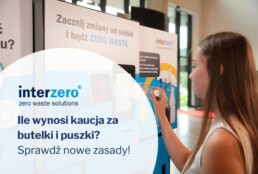
We know the deposit rates for bottles and cans - check the current rates
On 16 July 2024, the long-awaited regulation of the Minister of Climate and Environment on the amount of the deposit for packaging covered by the deposit system was published. How much will the deposit for beverage bottles and cans be?
Deposit for bottles and cans in the Polish deposit system from 2025.
In the Polish deposit system, the amount of the deposit will depend on the type of packaging. According to the latest regulation, from 2025. deposit rates for bottles and cans will be as follows:
- disposable plastic bottles up to 3 l - PLN 0.50,
- metal cans up to 1 l - PLN 0.50,
- reusable glass bottles up to 1.5 litres - PLN 1.00.
The regulation was issued on the basis of the delegation contained in Article 40m(2) of the Packaging and Packaging Waste Management Act (OJ. 2013 item 888). According to its provisions, the amount of the deposit should provide an incentive to return packaging and packaging waste by consumers, while being set at a socially acceptable level. The maximum amount of the deposit specified in the law can be PLN 2. Therefore, the Ministry should monitor the situation in the first months and years of the bail system and react on an ongoing basis by updating the amount of the deposit.
The referenced regulation comes into force 14 days after promulgation and will become effective in the last days of July 2024.
Let us recall that the first draft of the regulation assumed the adoption of a uniform rate of PLN 0.50 for all packages covered by the deposit scheme. However, it was met with numerous objections from bottlers and representatives of the waste industry, who pointed out that the proposed deposit rate for reusable glass bottles is lower than the deposit currently used in private return schemes (£1).
Changes to the bail system - what have the last few weeks brought?
The final determination of deposit amounts for the different types of packaging covered by the deposit system is not the only news in the polish bail systemwhich have been presented to the public in recent weeks.
- The following entered the game another third bail system operator. On 17 July 2024, the Minister of Climate and Environment authorised the Entity representing OK Operator Bailout S.A. to set up a bailout system covering single-use plastic bottles and metal beverage cans.
- About a year the date for the mandatory inclusion of glass bottles in the deposit system has been postponed reusable packaging. Thus, the private collection systems currently in place for such packaging can legally operate until 2026.
- Milk containers have been excluded from the deposit system and other dairy products, which coincides with the demands of the dairy industry. Initially, the deadline for inclusion in the deposit scheme was to be postponed by one year (until 2026), but eventually the Ministry of Climate and Environment dropped the idea altogether.
- Logo of the bail system unveiledwhich will be affixed to all packaging covered by the Polish deposit system.
80% paper recycling in Europe | Latest CEPI 2023 data
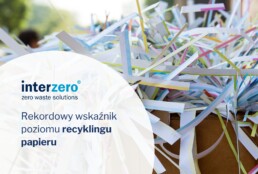
Paper recycling rates in Europe are rising. Find out key figures from the CEPI 2023 report
On 9 July 2024, the CEPI's latest report was released, providing production statistics for the European paper sector for 2023. Data from the report shows a deepening decline in paper and board production. At the same time, the recycling rate of raw material is increasing, reaching almost 80% last year.
Decline in paper and board production in Europe reflects global trends
The year 2023 was marked by declines in the paper industry. As much as by 13% compared to 2022, the production of paper and board has decreased. It seems that recent years have been a downward slope for the paper industry - paper consumption (down 13.5% vs 2022) and pulp production (0 17.5% vs 2022) are also falling significantly. However, this is not a localised problem - in the corresponding period we are witnessing a global slowdown, which, however, is not as great as in Europe. The EU economy as a whole has lost momentum in the face of the high cost of living (including energy prices), tighter monetary policy and weak external demand.
The dynamics of the production of individual types of paper and board products in 2023 varied considerably. Compared to the previous year, the amount of cardboard packaging produced decreased by 11%, and newsprint volumes by 20.6%. The largest production decreases of 23.7% were recorded in the graphic paper category. Sanitary and household paper was the most resilient to the market turmoil, with this segment declining by only 3.4%.
80 per cent recycling rate - the paper industry is getting closer to the GOZ dream
From the point of view of the paper industry, the figures presented in the CEPI report are quite pessimistic. A breath of optimism, however, comes from the waste and recycling industry - in 2023. The average recycling rate for the EU-27, Norway, Switzerland and the UK was as high as 79.3% (an increase of 8.2 pp compared to 2022). Thus, 6 years ahead of schedule, the goal of the signatories of the European Declaration on Paper Recycling to achieve a 76% paper recycling rate by 2030 has materialised. The record high annual recycling rate shows the autonomy of the industry and brings it closer to becoming a reality. closed loop economy.
Interestingly, the recorded increase in 2023 is due to a significant - 12% - decrease in paper and board consumption. This means that not only the industry, but also consumers are becoming more aware and starting to reduce their consumption of paper products and cardboard and paper packaging.
CEPI 2023 report shows progress in decarbonising the paper industry
Despite a number of results under the radar, the paper sector also has reason to be satisfied. For many years The decarbonisation of the industry is progressing gradually. In 2023, CO2 emissions fell by a further 5.8%, which means that a total of more than 46% of carbon emission reductions have already been achieved since 2005.
As the CEPI Director General's message reads:
"Given the context, the pulp and paper industry in Europe can be proud of what it has achieved in terms of climate action and closed loop. In a more conducive and predictable regulatory environment, our prospects could be very positive and our contribution to the EU Green Deal even greater."
In view of the decarbonisation targets set by the European Commission, it is estimated that emissions will be reduced even faster in the coming years. The condition, however, is to continue to increase investment, which, in the current difficult market situation, is one of the biggest challenges.
Source: European pulp & paper industry. Key statistics 2023, CEPI, https://www.cepi.org/wp-content/uploads/2024/07/Key-Statistics-2023-FINAL.pdf
Raw materials for paper production - what is paper made of in Europe?
What paper is made of - types and species of trees
The primary production of paper in Poland and throughout Europe uses softwood (75% production) and hardwood (25% production). It mainly comes from managed forests, where there is planned silviculture of trees to be felled. Another source of wood is the so-called maintenance felling of the remaining forests carried out in order to provide the neighbouring trees with optimal conditions for growth and crown development.
The most popular wood species for paper production are:
- Spruce - 40.5%,
- pine (so-called pulpwood) - 35%,
- birch - 11.4%,
- eucalyptus - 9.1%,
- Beech - 1.5%,
- aspen - 1.2%
- others (hornbeam, ash, maple, acacia, oak, alder, poplar, willow, chestnut) - 1.3%.
The decline in paper production recorded in recent years also translates into less interest in virgin raw material. In 2023, the volume consumption of softwoods is down by 1.1% and hardwoods by 5.7%.
Raw material for paper production "made in Europe"
According to the CEPI report, as much as 91% of the wood used for paper production in CEPI countries comes from their native forests. This is the highest rate since 2000 and a slight increase from 2022 (by 1 pp). Another 6.5 % is timber imported from EU countries that do not m. belong to CEPI. Thus, only 2.5% of wood comes from outside Europe. This means that Europe is almost self-sufficient in terms of raw material for paper production.
The role of recycled paper as a raw material should also be highlighted here. In 2023, in CEPI countries more than 53 million tonnes of waste paper and other paper waste were recycledthat have been reused in the manufacture of paper products. The leader here is cardboard - as much as 95% of cardboard and cardboard packaging is made from recycled paper.
Check, How paper is made in the first and subsequent circuits.
Wood chips - waste as raw material for paper production
In addition to the wood in the logs, wood chips are also used in paper production. These are small pieces of wood that arise as post-production waste from the furniture, lumber, packaging and joinery industries, among others. The scale of their use may surprise you - in 2023. as much as 21.4% of the total wood destined for the paper industry was wood chips.
According to the authors of the CEPI report, the use of industrial waste in the form of woodchips to produce paper is an important contribution to a circular economy. Although traditionally not considered as recycling by CEPI, this use of woodchips falls within its definition commonly accepted in the waste industry. Given the highest ever rate of paper recycling (almost 80%), it can be concluded that the CEPI countries have done their homework on circularity and are well on the way to creating a circular economy.
Source: European pulp & paper industry. Key statistics 2023, CEPI, https://www.cepi.org/wp-content/uploads/2024/07/Key-Statistics-2023-FINAL.pdf
Registration with BDO: Is it an obligation for every entrepreneur?
Registration with BDO: Is it an obligation for every entrepreneur?
What is BDO?
BDO (Database on products and packaging and waste management) is an IT system that is used to collect and manage waste management data. It allows electronic reporting and waste record keeping.
Who needs to register with BDO?
The obligation to register with BDO applies to both new companies and those that have been in business for many years. Registration must be obtained by entrepreneurs who:
- They generate waste and keep records of it.
- They market packaged products, vehicles, tyres, lubricating oils, batteries and accumulators to the Polish market.
- They produce or market packaging in Poland.
- They make intra-Community acquisitions of packaging.
- They introduce electrical and electronic equipment into the country.
- They run a shop or wholesale business and provide customers with plastic bags subject to a recycling fee.
Consequences of not registering with BDO
Lack of registration or incorrect registration with BDO can prevent businesses from fulfilling important environmental obligations and expose them to severe financial penalties. Failure to register can even be punished with a custodial sentence or a financial penalty of up to PLN 1,000,000.
How do I register with BDO?
Get expert help from the company Interzero. Their BDO registration service includes:
- Establish the actual scope of your company's activities.
- Identify the departments to be entered and the codes of the waste generated.
- Preparation and submission of application for registration with BDO
Remember that the registration process can take up to 30 days after submission of the application, so it is not worth delaying the formalities.
